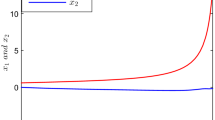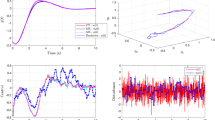Abstract
The problem of almost disturbance decoupling (ADD) for a class of inherently nonlinear systems is considered. The controlled systems are beyond triangular form and possess uncontrollable linearization. The performance of ADD is characterized in terms of L 2−L 2p gain. By using the tool of adding a power integrator, under a set of growth conditions a smooth sate feedback controller is explicitly constructed to attenuate the influence of the disturbance on the output with an arbitrary degree.
Similar content being viewed by others
References
A. Saberi and P. Sannuti, “Global stabilization with almost disturbance decoupling of a class of uncertain nonlinear systems,” International Journal of Control, vol. 47, no. 5, pp. 717–727, May 1988.
R. Marino, W. Respondek, and A. J. Van der Schaft., “Almost disturbanc decoupling for single-input single-output nonlinear systems,” IEEE Trans. on Automatic Control, vol. 34, no. 9, pp. 1013–1017, Sept. 1989.
R. Marino, W. Respondek, and A. J. Van der Schaft, “Nonlinear H ∞ almost disturbance decoupling,” Systems & Control Letters, vol. 23, no. 3, pp. 159–168, Sep. 1994.
A. Isidori, “A note on almost disturbance decoupling for nonlinear minimum phase systems,” Systems & Control Letters, vol. 27, no. 3, pp. 191–194, March 1996.
A. Isidori, “Global almost disturbance decoupling with stability for nonminimum-phase single-input single-output nonlinear systems,” Systems & Control Letters, vol. 28, no. 2, pp. 115–122, June 1996.
Z. Lin, “Almost disturbance decoupling with global asymptotic stability for nonlinear systems with disturbance-affected unstable zero dynamics,” Systems & Control Letters, vol. 33, no. 3, pp. 163–169, March 1998.
W. Su, L. Xie, and C. E. de Souza, “Global robust disturbance attenuation and almost disturbance decoupling for uncertain cascaded nonlinear systems,” Automatica, vol. 35, no. 4, pp. 697–707, April 1999.
C. Qian and W. Lin, “Almost disturbance decoupling for a class of high order nonlinear systems,” IEEE Trans. on Automatic Control, vol. 45, no. 6, pp. 1208–1214, June 2000.
W. Lin and C. Qian, “Adding one power integrator: a tool for global stabilization of high-order lower-triangular systems,” Systems & Control Letters, vol. 39, no. 5, pp. 339–351 April 2002.
D. Cheng and W. Lin, “On normal form of nonlinear systems,” IEEE Trans. on Automatic Control, vol. 48, no. 11, pp. 1242–1248, Nov. 2003.
W. Lin and C. Qian, “Adaptive control of nonlinearly parameterized systems: the smooth feedback case,” IEEE Trans. on Automatic Control, vol. 47, no. 8, pp. 1249–1266, Aug. 2002.
Author information
Authors and Affiliations
Corresponding author
Additional information
Recommended by Editorial Board member Guang-Hong Yang under the direction of Editor Jae Weon Choi. This work was supported by the Program for Changjiang Scholars and Innovative Research Team in University.
Yan-Ming Fu received his B.S. degree in Automatic Control from the Northeast Institute of Electric Power, China, in 2001, and the Ph.D. degree in Control Theory and Control Engineering from Harbin Institute of Technology, China, in 2006. He is currently a Lecture at the Center for Control Theory and Guidance Technology, Harbin Institute of Technology, China. His research interests include robust control and filtering, jumping systems, and time-delay systems.
Ai-Guo Wu was born in Gong’an County, Hubei Province, China on September 20, 1980. He received the B.Eng. degree in Automationin 2002, M.Eng. degree in Navigation, Guidance and Control in 2004 and Ph.D. degree in Control Science and Engineering in 2008 all from Harbin Institute of Technology. He has ever served as a General Secretary of the 25th Chinese Control Conference at Harbin. Since Dec. 2007, he has served as a Reviewer from American Mathematical Reviews. He is the author and co-author of over 40 publications. Now his main research interests include observer design, descriptor linear systems and nonlinear control.
Guang-Ren Duan was born on April 5, 1962. He received the B.Sc. degree in Applied Mathematics, and both the M. Sc. and Ph.D. degrees in Control Systems Theory. From 1989 to 1991, he was a Post-doctoral Researcher at Harbin Institute of Technology, where he became a Professor of control systems theory in 1991. Prof. Duan visited the University of Hull, UK, and the University of Sheffield, UK from December 1996 to October 1998, and worked at the Queen’s University of Belfast, UK from October 1998 to October 2002. Since August 2000, he has been elected Specially Employed Professor at Harbin Institute of Technology sponsored by the Cheung Kong Scholars Program of the Chinese government. He is currently the Director of the Center for Control Theory and Guidance Technology at Harbin Institute of Technology. He is the author and co-author of over 400 publications. His main research interests include robust control, eigenstructure assignment, descriptor systems, missile autopilot design and magnetic bearing control. Dr. Duan is a Charted Engineer in the UK, a Senior Member of IEEE and a Fellow of IEE.
Rights and permissions
About this article
Cite this article
Fu, YM., Wu, AG. & Duan, GR. Almost disturbance decoupling for a class of inherently nonlinear systems. Int. J. Control Autom. Syst. 7, 325–330 (2009). https://doi.org/10.1007/s12555-009-0220-x
Received:
Revised:
Accepted:
Published:
Issue Date:
DOI: https://doi.org/10.1007/s12555-009-0220-x




